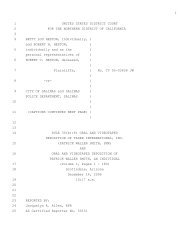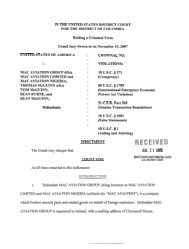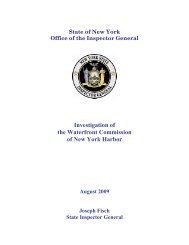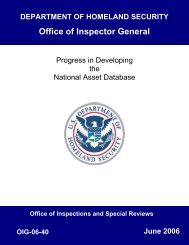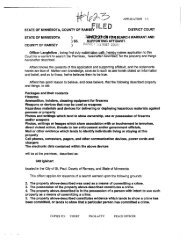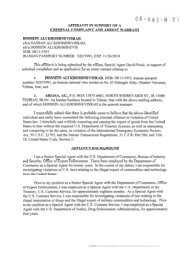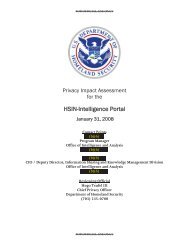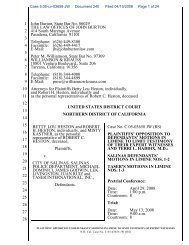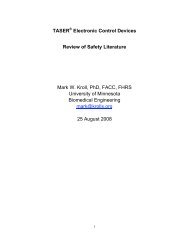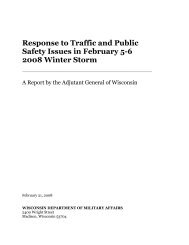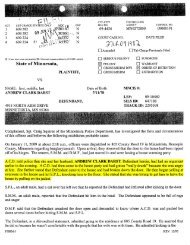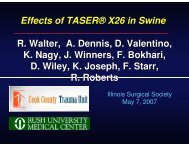Cite as: 547 U. S. ____ (2006)13SOUTER, J., dissentingover <strong>the</strong> classroom. ‘The vigilant protection <strong>of</strong> constitutionalfreedoms is nowhere more vital than in <strong>the</strong> community <strong>of</strong>American schools’” (quoting Shelton v. Tucker, 364 U. S.479, 487 (1960))); Sweezy v. New Hampshire, 354 U. S. 234,250 (1957) (a governmental enquiry into <strong>the</strong> contents <strong>of</strong> ascholar’s lectures at a state university “unquestionably wasan invasion <strong>of</strong> [his] liberties in <strong>the</strong> areas <strong>of</strong> academic freedomand political expression—areas in which governmentshould be extremely reticent to tread”).BThe majority’s second argument for its disputed limitation<strong>of</strong> Pickering doctrine is that <strong>the</strong> First Amendment haslittle or no work to do here owing to an assertedly comprehensivecomplement <strong>of</strong> state and national statutes protectinggovernment whistle-blowers from vindictive bosses.See ante, at 13–14. But even if I close my eyes to <strong>the</strong> tenetthat “‘[t]he applicability <strong>of</strong> a provision <strong>of</strong> <strong>the</strong> Constitutionhas never depended on <strong>the</strong> vagaries <strong>of</strong> state or federal law,’”Board <strong>of</strong> Comm’rs, Wabaunsee Cty. v. Umbehr, 518 U. S.668, 680 (1996), <strong>the</strong> majority’s counsel to rest easy fails onits own terms. 7To begin with, speech addressing <strong>of</strong>ficial wrongdoingmay well fall outside protected whistle-blowing, defined in<strong>the</strong> classic sense <strong>of</strong> exposing an <strong>of</strong>ficial’s fault to a thirdparty or to <strong>the</strong> public; <strong>the</strong> teacher in Givhan, for example,who raised <strong>the</strong> issue <strong>of</strong> unconstitutional hiring bias, wouldnot have qualified as that sort <strong>of</strong> whistle-blower, for she——————7Even though this <strong>Court</strong> has recognized that 42 U. S. C. §1983 “doesnot authorize a suit for every alleged violation <strong>of</strong> federal law,” Livadasv. Bradshaw, 512 U. S. 107, 132 (1994), <strong>the</strong> rule is that “§1983 remains agenerally and presumptively available remedy for claimed violations <strong>of</strong>federal law,” id., at 133. Individual enforcement under §1983 is renderedunavailable for alleged violations <strong>of</strong> federal law when <strong>the</strong> underlyingstatutory provision is part <strong>of</strong> a federal statutory scheme clearly incompatiblewith individual enforcement under §1983. See Rancho PalosVerdes v. Abrams, 544 U. S. 113, 119–120 (2005).
14 GARCETTI v. CEBALLOSSOUTER, J., dissentingwas fired after a private conversation with <strong>the</strong> schoolprincipal. In any event, <strong>the</strong> combined variants <strong>of</strong> statutorywhistle-blower definitions and protections add up to apatchwork, not a showing that worries may be remitted tolegislatures for relief. See D. Westman & N. Modesitt,Whistleblowing: Law <strong>of</strong> Retaliatory Discharge 67–75, 281–307 (2d ed. 20<strong>04</strong>). Some state statutes protect all governmentworkers, including <strong>the</strong> employees <strong>of</strong> municipalitiesand o<strong>the</strong>r subdivisions; 8 o<strong>the</strong>rs stop at state employees. 9Some limit protection to employees who tell <strong>the</strong>ir bossesbefore <strong>the</strong>y speak out; 10 o<strong>the</strong>rs forbid bosses from imposingany requirement to warn. 11 As for <strong>the</strong> federal WhistleblowerProtection Act <strong>of</strong> 1989, 5 U. S. C. §1213 et seq.,current case law requires an employee complaining <strong>of</strong>retaliation to show “‘irrefragable pro<strong>of</strong>’” that <strong>the</strong> personcriticized was not acting in good faith and in compliancewith <strong>the</strong> law, see Lachance v. White, 174 F. 3d 1378, 1381(CA Fed. 1999), cert. denied, 528 U. S. 1153 (2000). And——————8Del. Code Ann., Tit. 29, §5115 (2003); Fla. Stat. §112.3187 (2003);Haw. Rev. Stat. §378–61 (1993); Ky. Rev. Stat. Ann. §61.101 (West2005); Mass. Gen. Laws Ann., ch. 149, §185 (West 20<strong>04</strong>); Nev. Rev.Stat. §281.611 (2003); N. H. Rev. Stat. Ann. §275–E:1 (Supp. 2005);Ohio Rev. Code Ann. §4113.51 (Lexis 2001); Tenn. Code Ann. §50–1–3<strong>04</strong> (2006 Cum. Supp.).9Ala. Code §36–26A–1 et seq. (2001); Colo. Rev. Stat. §24–50.5–101 etseq. (20<strong>04</strong>); Iowa Code Ann. §70A.28 et seq. (1999); Kan. Stat. Ann. §75–2973 (2003 Cum. Supp.); Mo. Rev. Stat. §105.055 (20<strong>04</strong> Cum. Supp.);N. C. Gen. Stat. Ann. §126–84 (Lexis 2003); 2 Okla. Stat., Tit. 74, §840–2.5 et seq. (West 2005 Supp.); Wash. Rev. Code §42.40.010 (2000); Wyo.Stat. Ann. §9–11–102 (2003).10Idaho Code §6–21<strong>04</strong>(1)(a) (Lexis 20<strong>04</strong>); Me. Rev. Stat. Ann., Tit. 26,§833(2) (1988); Mass. Gen. Laws Ann., ch. 149, §185(c)(1) (West 20<strong>04</strong>);N. H. Rev. Stat. Ann. §275–E:2(II) (1999); N. J. Stat. Ann. §34:19–4(West 2000); N. Y. Civ. Serv. Law Ann. §75–b(2)(b) (West 1999); Wyo.Stat. Ann. §9–11–103(b) (2003).11Kan. Stat. Ann. §75–2973(d)(2) (Cum. Supp. 2003); Ky. Rev. Stat.Ann. §61.102(1) (West 2005); Mo. Rev. Stat. §105.055(2) (20<strong>04</strong> Cum.Supp.); 2 Okla. Stat., Tit. 74, §840–2.5(B)(4) (West 2005 Supp.); Ore.Rev. Stat. §659A.203(1)(c) (2003).
- Page 1 and 2: (Slip Opinion) OCTOBER TERM, 20051S
- Page 3 and 4: Cite as: 547 U. S. ____ (2006)3Syll
- Page 5 and 6: 2 GARCETTI v. CEBALLOSOpinion of th
- Page 7 and 8: 4 GARCETTI v. CEBALLOSOpinion of th
- Page 9 and 10: 6 GARCETTI v. CEBALLOSOpinion of th
- Page 11 and 12: 8 GARCETTI v. CEBALLOSOpinion of th
- Page 13 and 14: 10 GARCETTI v. CEBALLOSOpinion of t
- Page 15 and 16: 12 GARCETTI v. CEBALLOSOpinion of t
- Page 17 and 18: 14 GARCETTI v. CEBALLOSOpinion of t
- Page 19 and 20: 2 GARCETTI v. CEBALLOSSTEVENS, J.,
- Page 21 and 22: 2 GARCETTI v. CEBALLOSSOUTER, J., d
- Page 23 and 24: 4 GARCETTI v. CEBALLOSSOUTER, J., d
- Page 25 and 26: 6 GARCETTI v. CEBALLOSSOUTER, J., d
- Page 27 and 28: 8 GARCETTI v. CEBALLOSSOUTER, J., d
- Page 29 and 30: 10 GARCETTI v. CEBALLOSSOUTER, J.,
- Page 31: 12 GARCETTI v. CEBALLOSSOUTER, J.,
- Page 35 and 36: 16 GARCETTI v. CEBALLOSSOUTER, J.,
- Page 37 and 38: 18 GARCETTI v. CEBALLOSSOUTER, J.,
- Page 39 and 40: 2 GARCETTI v. CEBALLOSBREYER, J., d
- Page 41 and 42: 4 GARCETTI v. CEBALLOSBREYER, J., d
- Page 43: 6 GARCETTI v. CEBALLOSBREYER, J., d



